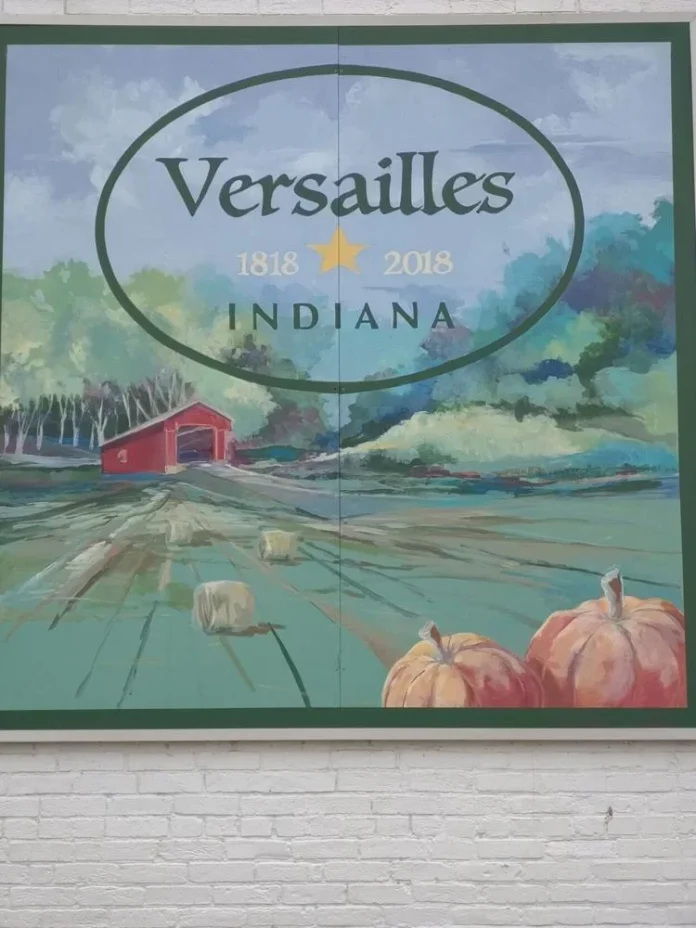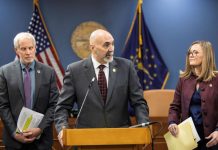By Marilyn Odendahl, The Indiana Citizen
JULY 20, 2023
Monday evening in Versailles, population 2,167, the courthouse square offered the kind of placid, picturesque, small-town setting that makes city dwellers sigh with envy.
The air was still and the sky was gently brushed with hints of pastels as the sun began its lazy descent over the horizon. A few stray dog walkers and a couple pushing a stroller meandered along the sidewalks while a handful of pickup trucks and a yellow fire engine ambled through the streets.
The revving engines, loud music, clogged roadways and the constant bustle of people common to urban centers were replaced by quiet and peace.Â
“I think we just get overshadowed by people in the city,†said Deborah Morin. “They seem to think that that’s all there is. Well, we have a different way of life.â€
Morin and her husband, Dan, were in Versailles to participate in the Republican Party caucus to select the new representative for House District 67. Others at the caucus, including the candidates, echoed her sentiments about preserving Indiana’s small communities and giving rural residents an equal voice in state government.Â
“It’s just a different way of life,†Morin continued. “We want to preserve that and have someone that we send (to the Statehouse) to honor that and to speak up for us.â€Â
The caucus tapped the young North Vernon Republican, J. Alex Zimmerman, an attorney who chose to move his family from Indianapolis to rural southeastern Indiana almost three years ago.
His stump speech championed traditional conservative Republican values – pro law enforcement, pro military, pro school choice and pro life – and called attention to the importance of the district’s rural heritage.
Zimmerman said he wants the state to invest in its rural communities so more young families, like his, will settle in small towns and “bring jobs, housing and development†as well as “ultimately increasing the tax revenue†of the district.Â
“I chose to live here,†Zimmerman told the caucus members. “I want southeast Indiana to be better, and I know all of us do too.â€Â
Advocating for the Heartland
Zimmerman was one of four candidates vying for the open House seat. The vacancy was created when former Rep. Randy Frye, who was first elected to the Indiana General Assembly in 2010, resigned July 8 due to “multiple health issues.â€
Because Frye stepped aside mid-term, his replacement was selected by the Republican precinct members from House District 67.
The district stretches across a swath of rural Indiana, covering Jennings, Jefferson and Ripley counties, and extends into southern Decatur County to include the towns of Millhousen and Westport. Madison anchors the district with 12,266 residents while tiny outposts like Holton, population 422, and Deputy, population 34, dot the landscape.Â
Zimmerman was not only the youngest of the four candidates vying for the open House seat, he was a relative newcomer to the area. He and his wife moved to North Vernon and opened their individual law offices in late 2020.Â
The other candidates were Deanna Burkart, a member of the Decatur County Council, Pamela Crozier, a member of the Jefferson County Council, and Lisa Seng Shadday, a former candidate for the General Assembly.
Zimmerman acknowledged his youth but emphasized his experience. He is a graduate of Indiana University Robert H. McKinney School of Law and the attorney for Jennings County. Most importantly, he worked for the Senate Republicans in the Statehouse for six years, rising to deputy majority attorney.
The one thing he learned from his Statehouse experience is that he will be the most junior member of the House majority. In addition, he will be starting in the middle of a term, so he will not get the benefit of having an orientation or enjoy the camaraderie that comes from being a part of a freshman class of legislators.
Speaking after his selection Monday, Zimmerman was focused on his agenda. He wants to streamline state government to benefit constituents and communities rather than what he has seen as the government working “harder against the people instead of working for the people.â€
Also, he wants to bring state dollars to rural Indiana.
“We do a good job of incentivizing rural development around Indianapolis or Jeffersonville or Fort Wayne or South Bend,†Zimmerman said, “but we don’t see a lot of that in the rural areas.â€
He said he would like to see more push for rural development but conceded, “What that looks like, I don’t exactly know.â€Â
First ballot
Once he decided to run in the caucus, Zimmerman launched a determined campaign. He focused on the caucus voters, visiting and calling them to introduce himself and discuss the issues.
The Morins are precinct members from Jennings County. In phone conversations and face-to-face meetings, the couple quizzed all four candidates on a variety of topics such as which legislative committees they would like to serve.
Dan Morin noted the House hopefuls were not much different in their political ideals. All were on the same side of “hot button issues†like abortion and school choice and “the need for a rural community to have good representation in the state.â€
“We had a good feel for what they intended to do and how well we thought they would do the job,†he said, adding, in his opinion, any one of the candidates would have been a good representative.
To win the caucus, the candidate needed to capture a simple majority of the votes (50% plus 1). Zimmerman won on the first ballot getting the 26 votes to send him to the Statehouse. When his selection was announced, the caucus members cheered and applauded.
Kyle Hupfer, chair of the Indiana Republican Party, said every caucus has a different dynamic and explaining how the members reach their decisions can be difficult.Â
Since 1973, a total of 131 members of the General Assembly have been elected through the caucus system, according to the Capitol & Washington database. Currently, the Statehouse has 31 members who entered the legislature through the caucus system.
Monday’s caucus started at 6 p.m. in the Ripley County Courthouse Annex. Each candidate was introduced by a supporter in a two minute speech then was given three minutes to talk to the room packed shoulder-to-shoulder with 49 voting caucus members. The candidates stood at the podium, outlining their beliefs and legislative agenda, and then stopped when a party official shouted, “Time!â€
Jeanie Hahn, former Jennings County Republican Party chair, introduced Zimmerman. She echoed others on two themes – the importance of rural communities and the qualifications of all the candidates.
“We have small cities and small towns. That’s the way we like it,†Hahn said. “So we need someone to go to Indianapolis and fight for us.â€Â
From his vantage point, Hupfer sees the state making investments in rural areas.Â
“If you look at what’s been going on, there’s a significant flow of dollars to rural communities,†Hupfer said. “Every single county now is part of a regional development that have been getting dollars out of READI (Regional Economic Acceleration Development Initiative) grants and then those regions are deciding the best way to deploy them.â€
Hupfer noted along with bringing a rural voice to the Statehouse, Zimmerman will also inject some youthful energy to the House majority. The young attorney, greeting well-wishers and patiently answering reporters’ questions following the caucus vote, seemed to reflect a generational shift within the Grand Old Party.
Zimmerman championed mainstay GOP issues such as advocating schools stick to teaching reading, writing and arithmetic. “No more critical race theory and no teaching about gender issues in our schools,†he said.
But, when discussing the Indiana’s future, he pointed to the need for renewable energy. The state has “no framework for solar or wind energy†even as utilities converting their coal-fired plants, he said.
In seeing energy as a pressing issue for the Hoosier state, he highlighted the connection between rural and urban. Indiana’s plans will have to keep places like Versailles vibrant while also ensuring what helps one region does not harm another.
“I hope to be part of that conversation,†Zimmerman said, “so that it benefits not just southeast Indiana but the whole state.â€





